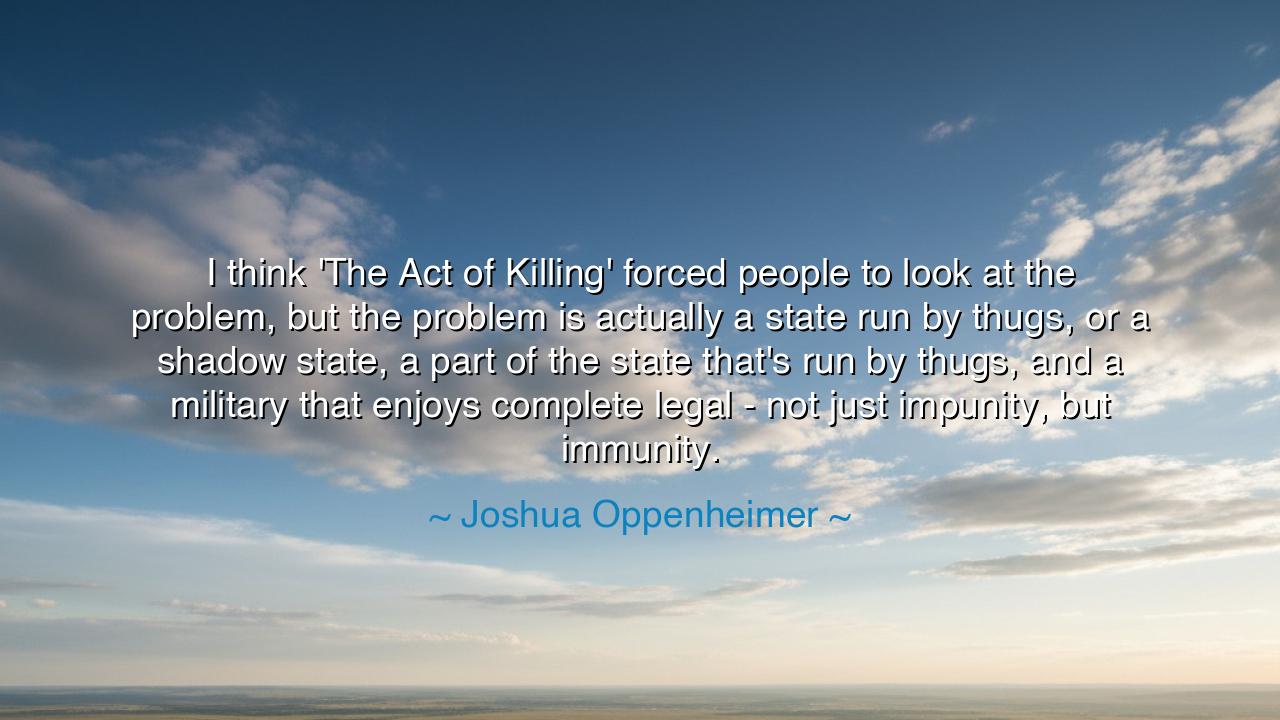
I think 'The Act of Killing' forced people to look at the
I think 'The Act of Killing' forced people to look at the problem, but the problem is actually a state run by thugs, or a shadow state, a part of the state that's run by thugs, and a military that enjoys complete legal - not just impunity, but immunity.






Hear now the words of Joshua Oppenheimer, who gazed into the abyss of forgotten crimes and dared to speak of what he saw: “I think The Act of Killing forced people to look at the problem, but the problem is actually a state run by thugs, or a shadow state, a part of the state that's run by thugs, and a military that enjoys complete legal—not just impunity, but immunity.” His voice is not the voice of one man only, but of all truth-seekers who confront the powers of deception. He reminds us that the darkest chains are not forged in silence, but in the masquerade of law itself, when power cloaks injustice in the robes of authority.
Oppenheimer, through his film The Act of Killing, stripped away the veil that concealed the massacre of hundreds of thousands in Indonesia, exposing how killers were celebrated as heroes, their crimes sung like triumphant ballads rather than mourned as tragedies. His words reveal the sickness that lies deeper than one event: the shadow state, where rulers, generals, and merchants of blood form an invisible order, bound not by justice but by profit, fear, and violence. It is a state that wears the mask of civilization but is governed by thugs who wield death without consequence.
In the chronicles of history, we find echoes of this shadow realm. Consider the story of Rome’s decline, when emperors raised up Praetorian guards who, sworn to protect, instead sold the throne to the highest bidder. These soldiers, meant to defend the empire, became thugs in uniform, immune to punishment, shaping the destiny of nations with daggers in the dark. Like Indonesia’s killers, they lived not as servants of law but as its manipulators, bending empire to their will. The empire did not fall in one night; it rotted from within, consumed by a cancer of unchecked power.
Let us not imagine that such things belong only to ancient or foreign lands. In every age, where impunity reigns, where those who commit crimes against humanity walk as free men, there the shadow state lurks. Its presence may not be announced by armies marching in the streets, but by silence—by the absence of justice, by the trembling of the oppressed, by the rewriting of memory itself. The greatest triumph of the thug is not in killing the body, but in killing the truth.
Yet within this darkness lies a call to courage. To look upon injustice and dare not to turn away is itself a holy act. Oppenheimer forced the world to behold the spectacle of the killers themselves, boasting of slaughter, and in doing so he held up a mirror to humanity. The lesson is clear: until the hidden state is seen, until the thugs are unmasked, there can be no healing, no peace. To see the truth is painful, yet blindness is the greater peril.
What, then, shall we do, we who walk in safer lands yet still dwell under the reach of power? First, we must resist forgetting. To remember the victims, to speak their names, is to deny the immunity of their killers. Second, we must cultivate vigilance, for the shadow state thrives in complacency. Let us question authority, demand accountability, and guard against the slow corruption of justice.
In our own lives, the battle may seem small, yet it is not without weight. When we stand against bullying in our schools, corruption in our workplaces, or deceit in our communities, we fight the same spirit that governs the world’s tyrannies. When we shield the vulnerable, when we honor truth even at cost, we tear down the mask of the thug.
So remember, O seeker: the world may often be governed by shadows, but light does not falter because night has fallen. Carry truth as a torch, speak boldly against injustice, and never grant evil the immunity of your silence. For the state of thugs endures only as long as men and women close their eyes. Open them—and the shadow crumbles.






AAdministratorAdministrator
Welcome, honored guests. Please leave a comment, we will respond soon